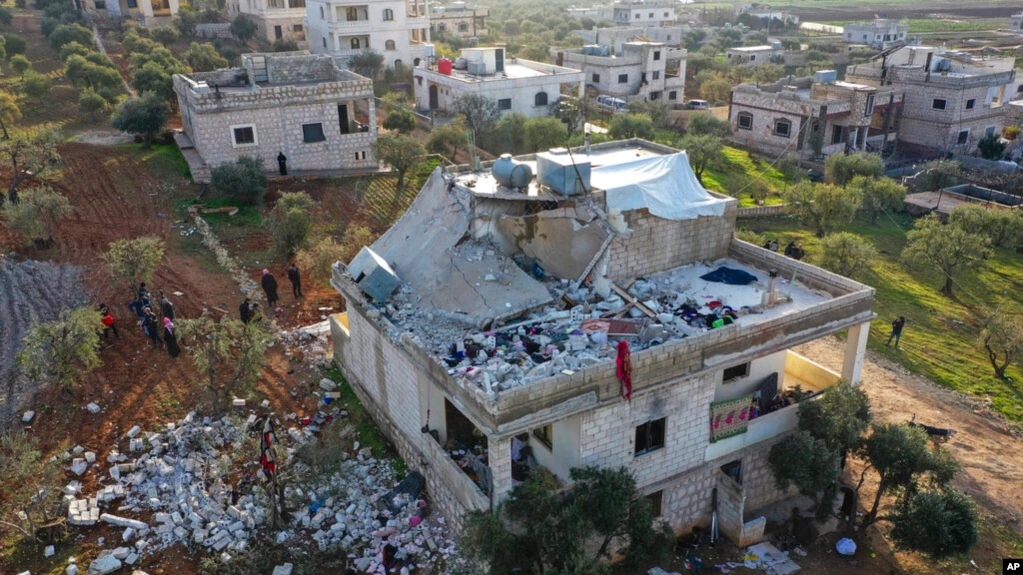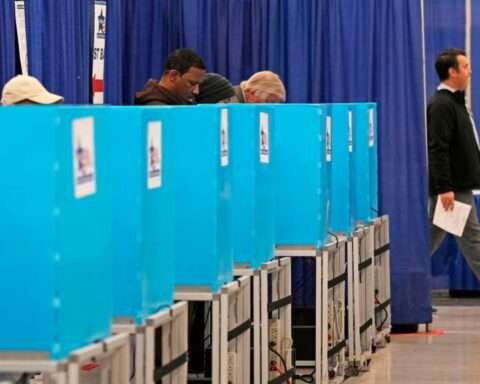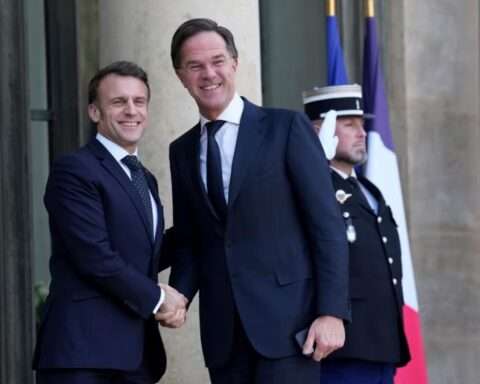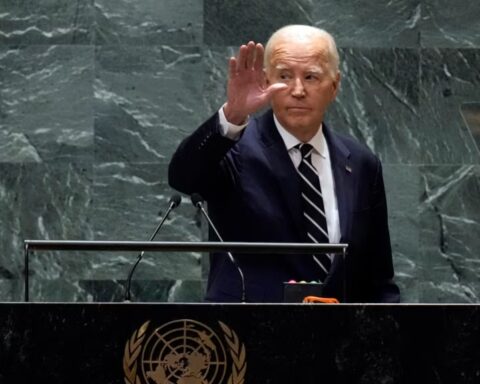WASHINGTON — Top U.S. officials are hopeful that a risky nighttime raid, months in the making, will deal one of the world’s most resilient terror groups a long-lasting setback and blunt its efforts to strike at the United States and its Western allies.
U.S. President Joe Biden announced the death of reclusive Islamic State leader Amir Muhammad Sa’id Abdal-Rahman al-Mawla early Thursday, hours after U.S. special forces left his hideout and his body in northwest Syria’s Idlib province.
Al-Mawla “oversaw the spread of ISIS-affiliated terrorist groups around the world,” Biden told reporters gathered at the White House, using an acronym for the terror group, which is also called IS or Daesh.
“After savaging communities and murdering innocents, [al-Mawla] was responsible for the recent brutal attack on a prison in northeast Syria holding ISIS fighters,” the president said. “This operation is testament to America’s reach and capability to take out terrorist threats no matter where they try to hide. … We will come after you and find you.”
Al-Mawla
Al-Mawla, known by multiple aliases, including Abu Ibrahim al-Hashimi al-Qurashi and Hajji ‘Abdallah, was born in Iraq in 1976 and became a religious scholar who rose through the terror group’s ranks, becoming a top aide to former IS leader and self-declared caliph Abu Bakr al-Baghdadi.
By the time Baghdadi died in a U.S. raid on his hideout in northwestern Syria in October 2019, al-Mawla had become the heir apparent, having overseen IS’s slaughter of the Yazidi religious minority and some of the terror group’s global operations.
As leader, al-Mawla was even more reclusive than Baghdadi, who made occasional speeches to rally supporters, leading some analysts to wonder how much control he retained as IS affiliates outside Syria and Iraq gained in power and prominence.
U.S. officials, however, said al-Mawla was finding ways to be effective in building and expanding the bureaucracy that underpinned the terror group’s networks.
“While Baghdadi was iconic and a philosopher figure in ISIS, this guy was actually far more of an operational planner and a director of operations,” General Kenneth “Frank” McKenzie, the commander of U.S. Central Command, told a virtual conference late Thursday.
Disrupting IS operations
Al-Mawla “was every bit as evil and every bit as committed to attacks on the United States and our partners,” McKenzie said, adding that al-Mawla’s death could see IS leaders in Syria and Iraq cede power to regional affiliates.
But the affiliates could also suffer with al-Mawla out of the way.
“When you don’t have a central core that can disperse money and share money among competing franchises, it makes it harder for them to be resourced,” McKenzie said. “I think it’s going to be a significant blow.”
U.S. officials are also hoping the way in which al-Mawla died will further demoralize the terror group and its force of 8,000 to 16,000 fighters spread across Syria and Iraq.
“In a final act of cowardice and disregard for human life, [al-Mawla] detonated a blast, a significant blast, killing himself and several others, including his wife and children,” a senior administration official who spoke on the condition of anonymity to discuss the U.S. operation told reporters.
“The blast was so large on the third floor that it blew bodies outside of the house and into the surrounding areas,” the official added.
The raid
U.S. defense officials said al-Mawla set off the explosion shortly after U.S. forces arrived at his hideout, a nondescript building in a residential section of Atmeh, a town in Syria’s Idlib province, not far from the border with Turkey.
Using a megaphone, the U.S. forces asked for al-Mawla and one of his senior deputies to allow noncombatants to leave, and to give themselves up.
Officials said a family of six living on the first floor got out, with the explosion shaking the building not long after.
“Let me be very clear, [al-Mawla] did not fight,” McKenzie said. “He killed himself and his immediate family without fighting, even as we attempted to call for his surrender and offered him a path to survive.”
Al-Mawla’s deputy and his wife then barricaded themselves on the second floor, dying after engaging in a firefight with U.S. forces.
One child on the second floor was also killed, though four others were rescued by U.S. troops.
Children among the dead
Initial reports from groups such as the British-based Syrian Observatory for Human Rights said at least 13 people had been killed, including three women and four children.
Save the Children, an international humanitarian organization, said late Thursday that at least six children had been killed, calling the deaths “deeply alarming and unacceptable.”
U.S. officials insisted they had taken all possible precautions, blaming the deaths on the IS leader himself.
“We had a good sense of who was in the building … and had taken numerous safeguards throughout the rehearsals and planning to protect those individuals,” a second senior administration official said.
He added that military planners even opted for a raid, with U.S. forces scheduled to be on the ground for two hours, instead of an airstrike, to minimize harm to noncombatants.
Complications
U.S. military officials said despite the success of the initial operation, there were some complications.
One of the helicopters used to get troops to al-Mawla’s hideout experienced mechanical difficulties and had to be abandoned and destroyed shortly after leaving the site.
U.S. forces also briefly came under attack from fighters with the al-Qaida-affiliated Hayat Tahrir al-Sham, killing two of them in the ensuing firefight.
The presence of al-Qaida-linked fighters, however, was not unexpected given that northwestern Syria doubles as a hub for al-Qaida, IS’s main rival, and, according to U.N. member state intelligence agencies, “a strategic location for [IS] fighters and family members, in particular as a gateway to Turkey.”
US partners
The U.S. operation quickly earned praise from key partners, including the coalition-backed Syrian Democratic Forces.
“This is a strategic gain,” SDF spokesman Farhad Shami told VOA on Thursday, calling al-Mawla’s death “significant.”
SDF officials, still feeling the sting of the nearly weeklong IS attack and uprising at al-Sina’a prison in Hasaka, have warned the incident was part of a larger plot by the terror group to take and hold territory.
They have also said that much of the planning for the attack, which killed more than 100 soldiers, guards and prison staff, had come from IS leaders, including al-Mawla, something U.S. officials confirmed Thursday.
“We consider this operation of eliminating [the] ISIS leader as revenge for their attack on Hasaka,” Shami told VOA, adding that SDF forces had provided resources and intelligence to the U.S. forces who carried out the raid.
Iraqi officials Thursday also celebrated al-Mawla’s demise and tweeted that Iraqi intelligence had contributed information leading to his location.
IS reaction
IS followers have also started to react to al-Mawla’s death, though initial posts on social media platforms reflected a strong sense of disbelief.
“What is the truth in the news of the Caliph’s martyrdom?” one supporter wrote in a post captured by Jihadoscope, a company that monitors online activity by Islamist extremists.
“Impure media are spreading rumors everywhere,” the follower added.
Another decried the initial report as “fake news,” accusing the U.S. of fabricating events to boost its own morale.
But Jihadoscope co-founder Raphael Gluck told VOA that as the hours passed, more IS followers began to accept that al-Mawla had indeed been killed and began focusing their anger at the U.S. and al-Qaida, accusing the terror group’s affiliates of collaboration.
What’s next for IS
U.S. officials say they are watching closely, with IS expected to name a successor. But those plans may have been complicated by recent developments in Iraq.
In October, Iraqi forces arrested Sami Jasim Muhammad al-Jaburi, also known as Hajji Hamid, described by the Pentagon as “one of ISIS’s most senior leaders.”
One Western counterterrorism official, speaking to VOA on the condition of anonymity to discuss intelligence, called al-Jaburi’s arrest “very significant” as al-Jaburi was seen as a candidate to potentially replace al-Mawla should he be killed or captured.
Mutlu Civiroglu contributed to this report.






